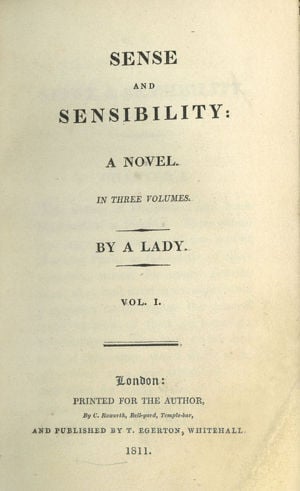
Sense & Sensibility (Chap. 41) Jane Austen
На этой странице вы найдете полный текст песни "Sense & Sensibility (Chap. 41)" от Jane Austen. Lyrxo предлагает вам самый полный и точный текст этой композиции без лишних отвлекающих факторов. Узнайте все куплеты и припев, чтобы лучше понять любимую песню и насладиться ею в полной мере. Идеально для фанатов и всех, кто ценит качественную музыку.

Edward, having carried his thanks to Colonel Brandon, proceeded with his happiness to Lucy; and such was the excess of it by the time he reached Bartlett's Buildings, that she was able to assure Mrs. Jennings, who called on her again the next day with her congratulations, that she had never seen him in such spirits before in her life.
Her own happiness, and her own spirits, were at least very certain; and she joined Mrs. Jennings most heartily in her expectation of their being all comfortably together in Delaford Parsonage before Michaelmas. So far was she, at the same time, from any backwardness to give Elinor that credit which Edward WOULD give her, that she spoke of her friendship for them both with the most grateful warmth, was ready to own all their obligation to her, and openly declared that no exertion for their good on Miss Dashwood's part, either present or future, would ever surprise her, for she believed her capable of doing any thing in the world for those she really valued. As for Colonel Brandon, she was not only ready to worship him as a saint, but was moreover truly anxious that he should be treated as one in all worldly concerns; anxious that his tithes should be raised to the utmost; and scarcely resolved to avail herself, at Delaford, as far as she possibly could, of his servants, his carriage, his cows, and his poultry.
It was now above a week since John Dashwood had called in Berkeley Street, and as since that time no notice had been taken by them of his wife's indisposition, beyond one verbal enquiry, Elinor began to feel it necessary to pay her a visit.—This was an obligation, however, which not only opposed her own inclination, but which had not the assistance of any encouragement from her companions. Marianne, not contented with absolutely refusing to go herself, was very urgent to prevent her sister's going at all; and Mrs. Jennings, though her carriage was always at Elinor's service, so very much disliked Mrs. John Dashwood, that not even her curiosity to see how she looked after the late discovery, nor her strong desire to affront her by taking Edward's part, could overcome her unwillingness to be in her company again. The consequence was, that Elinor set out by herself to pay a visit, for which no one could really have less inclination, and to run the risk of a tete-a-tete with a woman, whom neither of the others had so much reason to dislike.
Mrs. Dashwood was denied; but before the carriage could turn from the house, her husband accidentally came out. He expressed great pleasure in meeting Elinor, told her that he had been just going to call in Berkeley Street, and, assuring her that Fanny would be very glad to see her, invited her to come in.
They walked up stairs in to the drawing-room.—Nobody was there.
"Fanny is in her own room, I suppose," said he:—"I will go to her presently, for I am sure she will not have the least objection in the world to seeing YOU.— Very far from it, indeed. NOW especially there cannot be—but however, you and Marianne were always great favourites.—Why would not Marianne come?"—
Elinor made what excuse she could for her.
"I am not sorry to see you alone," he replied, "for I have a good deal to say to you. This living of Colonel Brandon's—can it be true?—has he really given it to Edward?—I heard it yesterday by chance, and was coming to you on purpose to enquire farther about it."
"It is perfectly true.—Colonel Brandon has given the living of Delaford to Edward."
"Really!—Well, this is very astonishing!—no relationship!—no connection between them!—and now that livings fetch such a price!—what was the value of this?"
"About two hundred a year."
"Very well—and for the next presentation to a living of that value—supposing the late incumbent to have been old and sickly, and likely to vacate it soon—he might have got I dare say—fourteen hundred pounds. And how came he not to have settled that matter before this person's death?—NOW indeed it would be too late to sell it, but a man of Colonel Brandon's sense!—I wonder he should be so improvident in a point of such common, such natural, concern!—Well, I am convinced that there is a vast deal of inconsistency in almost every human character. I suppose, however—on recollection—that the case may probably be THIS. Edward is only to hold the living till the person to whom the Colonel has really sold the presentation, is old enough to take it.—Aye, aye, that is the fact, depend upon it."
Elinor contradicted it, however, very positively; and by relating that she had herself been employed in conveying the offer from Colonel Brandon to Edward, and, therefore, must understand the terms on which it was given, obliged him to submit to her authority.
Комментарии (0)
Минимальная длина комментария — 50 символов.












